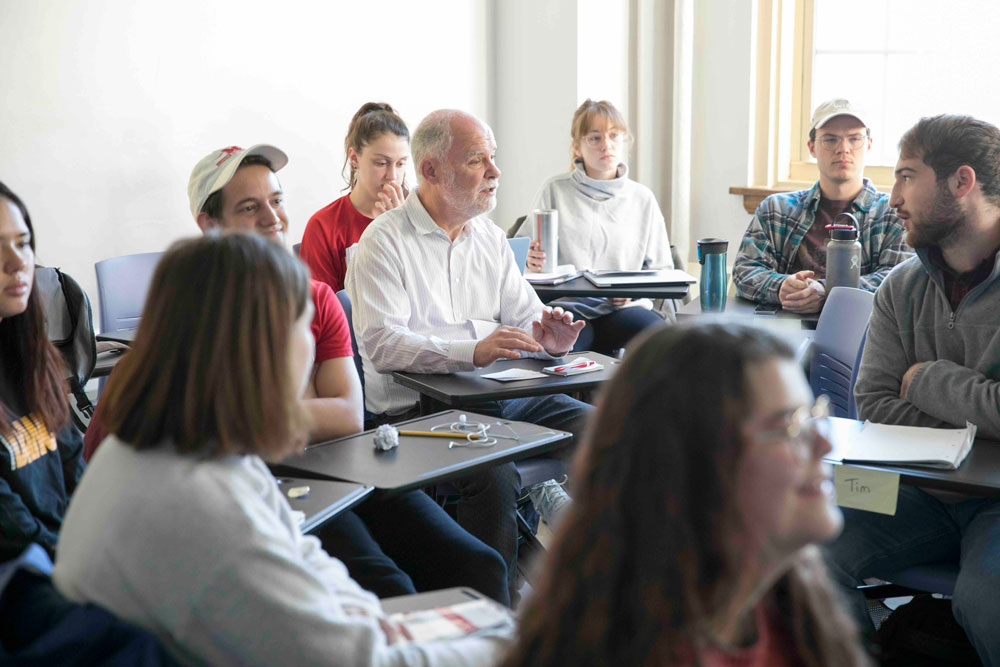World Languages and Cultures major to offer a fresh take on key humanities strengths
The new major, which unifies six former majors, begins accepting students this upcoming fall.

World Languages and Cultures major to offer a fresh take on key humanities strengths
Miami University’s new World Languages and Cultures (WLC) major offers an innovative approach to global understanding by drawing on the strengths of courses associated with seven different languages and cultures. Offered as a Bachelor of Arts degree in the College of Arts and Science (CAS) to all undergraduates, students can tailor their studies by choosing from three specializations, opening doors to diverse career pathways around the globe.
Recently approved by the Ohio Department of Higher Education, the WLC major encompasses Classical Studies (Latin), East Asian Languages and Cultures (Japanese and Chinese), French, German, Italian Studies, and Russian, East European, and Eurasian Studies. Its unique structure supports various flexible pathways, devoted to the in-depth study of one language and its cultural systems (taught in the target language) and/or a more comparative exploration of multiple literatures and cultures through courses taught in English.
"With this program, CAS continues to build on the strengths of the liberal arts — curiosity, creativity, and critical thinking — while preparing our students to succeed in the emerging fields of tomorrow,” said Renée Baernstein, dean of the College of Arts and Science.
With the growing demand for global perspectives, faculty in the Department of French, Italian, and Classical Studies (FIC) and the Department of German, Russian, Asian, and Middle Eastern Languages and Cultures (GRAMELAC) collaborated to create the WLC major, a groundbreaking program that streamlines the curriculum while highlighting the rich intersections between world languages, literatures, and cultures. At its heart are two dynamic interdisciplinary seminars — "Sustainable Cities" and "The Year that Changed the World" (set to launch in 2026) — and a capstone experience. These courses will be offered in rotation by 20 dedicated full-time faculty members, ensuring students benefit from a wide range of expertise and perspectives.
Mila Ganeva, chair of GRAMELAC; Elisabeth Hodges, interim chair of English and former chair of FIC; and Mark McKinney, acting chair of FIC, will support and promote the WLC major in coordination with faculty who advise students and teach related courses.
"By studying intercultural perspectives and world languages, WLC students will be prepared for lifelong success in a dynamic and changing global job marketplace," Hodges said.
Ganeva added that the world languages component of the WLC major is particularly adaptable. “We designed the major in anticipation of fluctuating interest in particular languages,” she said. “This built-in flexibility will help us adjust our offerings to the market needs of our constantly changing world.”
WLC students begin by selecting a foundation course that introduces them to key concepts, genres, and cultural and historical contexts. They then choose two core courses that develop skills in close reading and analysis, building persuasive arguments, and understanding cultural differences. Finally, they choose elective courses in one of three recommended areas of specialization:
- World Cultures and Historical Perspectives
- World Stories, Literatures, and Cinemas
- Immersive World Languages (Chinese, French, German, Italian, Japanese, Latin, or Russian)
The WLC degree culminates in a senior year capstone project that invites students to synthesize the cross-cultural knowledge they have acquired from different viewpoints, employ interdisciplinary methods, conduct independent research, and construct convincing arguments.
"In line with our CAS Means Careers initiative, the WLC major and its three specializations will allow students to focus on their strengths and interests as they prepare for a prosperous life after Miami,” Baernstein said.
Humanities majors are one of the three CAS focus areas, along with natural sciences and social sciences. Programs in history and philosophy, literature and writing, and media and communication will all be housed in Bachelor Hall when it reopens in spring 2026 as the university’s humanities hub. This new space, like the WLC major, represents CAS’s commitment to innovative and interdisciplinary programs that prepare current and future generations of students for ongoing global challenges.
Visit the World Languages and Cultures website to learn more.